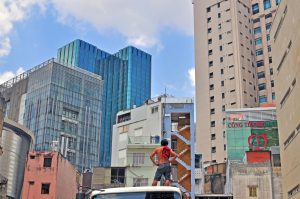The head of the Communist Party of Vietnam (CPV) has pledged to broaden and deepen its campaign against corruption, a week after police revealed the scale of an ongoing graft investigation worth an estimated $12.5 billion.
“We need to conduct the anti-corruption fight faster in a more efficient manner,” CPV General Secretary Nguyen Phu Trong said on Wednesday, Reuters reported, citing state media reports. “We won’t stop here, but will continue for the long term.”
Trong’s anti-corruption campaign, known commonly as dot lo, or “blazing furnace,” has been raging since 2016. During that time, it has netted thousands of bureaucrats, government officials, including a former foreign minister and deputy prime minister, and corporate executives. Even then, the campaign has yet to plumb the bottom of the CPV party-state, with the past year bringing so many reported arrests and scandals that it is getting hard to keep track of them.
Trong’s comments came after the Ministry of Public Security late last week announced the outcome of months-long investigations into two financial scandals. In the biggest of the two scandals, it alleges that Truong My Lan, the chairperson of real estate developer Van Thinh Phat Holdings Group, along with scores of accomplices, embezzled a scarcely believable 304 trillion dong ($12.54 billion) from Saigon Commercial Bank (SCB).
Describing Lan’s violations as “extremely elaborate, meticulous, with detailed and carefully prepared scripts,” the MPS recommended that she be charged with a variety of crimes, including bribery, violating banking regulations, and embezzlement. It also recommended charges against a further 85 people, including 24 government officials, who benefited and helped facilitate the scheme.
Yesterday, the CPV’s Central Internal Affairs Committee reported that a further 23 government officials, including 12 officials from the State Bank of Vietnam, an official of the National Financial Supervisory Commission, and an official of the Central Inspection Committee, were also being investigated. Many have been charged with taking bribes to cover up SCB’s wrongdoings.
Lan’s scheme involved financial chicanery of mind-boggling intricacy, involving more than 1,000 domestic and foreign subsidiaries and member companies that were set up under Van Thinh Phat’s umbrella, according to a report by VnExpress. The report cites investigators as saying that Lan and her accomplices used the SCB, of which she has been the majority shareholder since 2012, as their personal ATM, taking out an estimated 1 quadrillion dong ($44 billion) in loans against the savings of SCB’s customers. Of this, she eventually appropriated 304 trillion dong through complex machinations involving false loan applications and “ghost companies” she controlled. Investigators allege that the scheme was facilitated by members of Lan’s family who hold senior positions at the SCB and “basically served her.”
If accurate, the scale of this theft is hard to exaggerate. As per Reuters’ calculation, the amount is equivalent to 3.2 percent of the Vietnamese economy and exceeds even the sums lost in the globe-spanning 1MDB scandal in Malaysia, which helped bring down former Prime Minister Najib Razak. The figure is also greater than the market caps of every one of Vietnam’s banks, bar Vietcombank. As the journalist Michael Tatarski wrote in his Vietnam Weekly newsletter earlier this week, “We’re talking historic numbers on a global scale here.”
Lan, who founded Van Thinh Phat in 1992, was arrested in October of last year, along with her granddaughter Truong Hue Van, 34, the CEO of Windsor Property Management, and several other alleged close accomplices. Since then, the case has scarcely been out of the headlines, with Vietnamese state media being given full rein to publicize every small twist and revelation.
The scale of the case reflects the CPV’s struggle to cut the corruption out of the Vietnamese party-state, with every year seemingly bringing greater and more eye-popping revelations. While the constant flow of arrests could be a sign that the campaign is succeeding, the fact that the accumulated resources of the Party have yet to touch the bottom on this issue reflects the almost systemic nature of the problem – one that may be inseparable from the CPV’s monopoly on power.
The scandal also reflects the shaky reality of Vietnam’s banking industry and the lack of oversight that prevails in much of the sector. Dang Dinh Manh, who worked as a lawyer in Vietnam for more than 20 years and now lives in the United States, told Radio Free Asia that the investigation was a sign of “the horrific level of crime committed by Van Thinh Phat Group.” He added, “A series of legal barriers to ensure healthy control of business operations have all been effectively nullified by Van Thinh Phat with the collusion of more than a few government officials.”
Lan’s arrest led to plummeting confidence in the Vietnamese real estate sector, and now that the scale of the graft has become clear, questions will arise about a possible contagion of the banking sector from the massive volume of bad debt in the real estate sector, as the Asian Development Bank warned back in September. Earlier this week, Reuters reported that listed property developers faced “increased pressure to pay their large debts as profits plunged and their cash reserves dropped to the lowest levels in more than five years.”
































